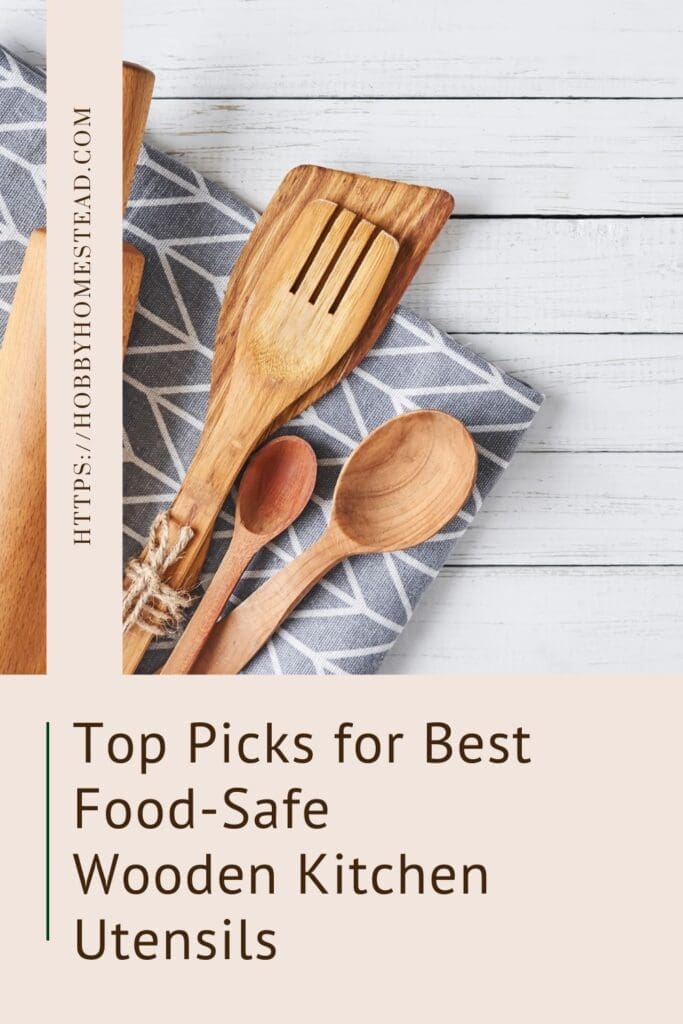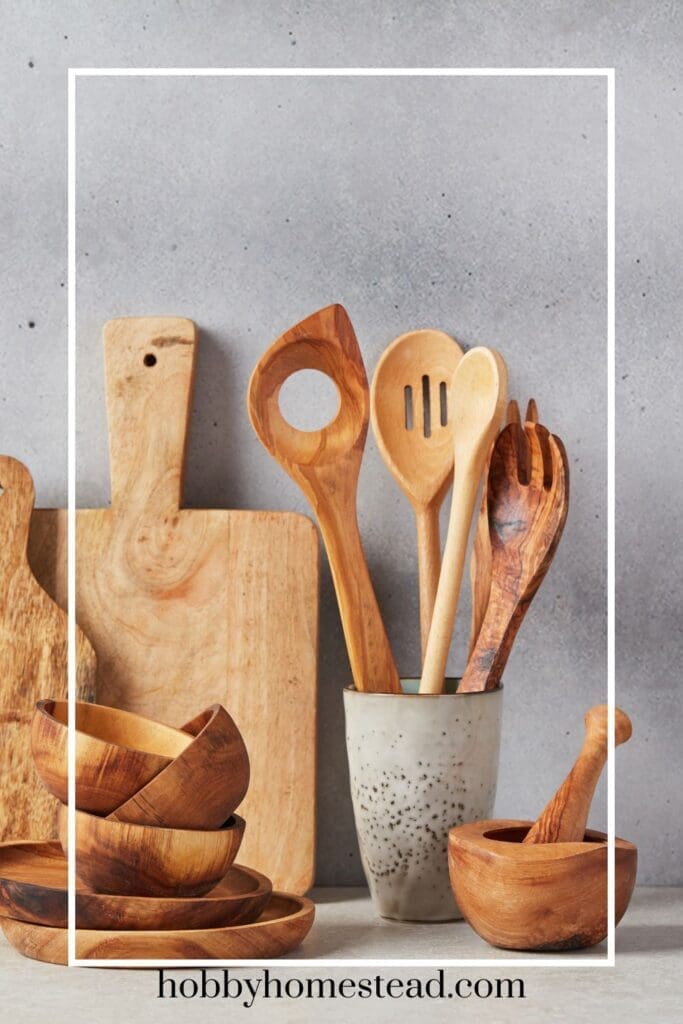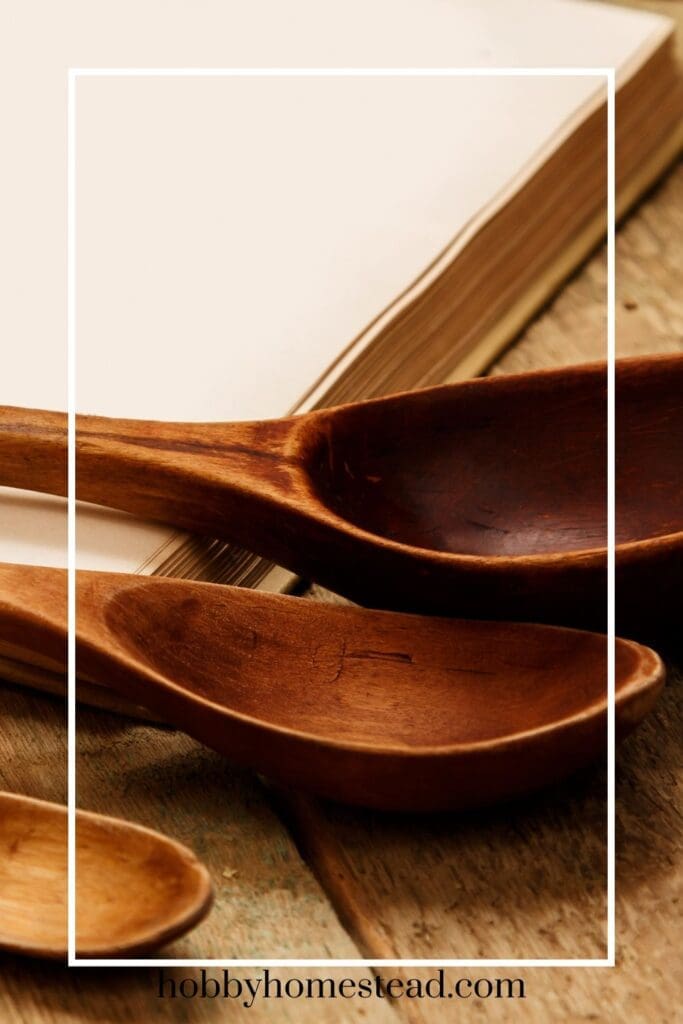Wooden kitchen utensils are not only heat resistant and gentle on cookware, but they also bring aesthetic appeal to your kitchen with their natural colors, unique designs, and smooth texture. In recent years, more people have made the switch from plastic utensils and metal spoons to natural, eco-conscious alternatives.
We love using our wooden utensils. I have a special bamboo spoon that I reach for the most. They work great whether you’re sautéing ground beef, flipping pancakes, or stirring a bubbling pot of soup.
Wooden kitchen tools offer warmth, durability, and a timeless charm that synthetic utensils can’t match. For the home cook looking for kitchen tools that combine function and beauty, food-safe wooden kitchen utensils are truly the best choice.
But not all woods for kitchen utensils are created equal.
Choosing the right kind of wood is essential for durability, food safety, and performance.

Why Wooden Utensils Are a Great Choice
Wooden utensils are a popular choice among home cooks for good reason. They’re naturally heat-resistant, meaning they won’t melt when used at high temperatures like rubber spatulas or plastic utensils. The smooth, rounded edges won’t scratch your nonstick pans or damage the bottom of the pan the way stainless steel can.
More importantly, wood is a natural material with antibacterial properties. Especially when made from dense wood with a tight grain pattern. With proper care, a good wooden spoon or spatula can last a long time and actually improve with regular use.
Top 4 Picks Takeaways
- Walnut Wood
Walnut stands out for its exceptional durability and rich, dark color.
With a tight grain that naturally resists bacteria and moisture, walnut utensils offer both beauty and long-lasting performance, making them a top choice for home cooks seeking reliable and elegant kitchen tools.
- Maple Wood
Hard maple is a classic, food-safe hardwood prized for its strength and light color.
Its dense, tight grain minimizes bacterial growth and staining, while its excellent hardness ensures maple utensils hold up well under regular use and high temperatures, perfect for versatile kitchen work.
- Olive Wood
Olive wood is renowned for its dense structure and unique swirling grain patterns.
Naturally rich in oils, it resists moisture and microbial growth, making olive wood utensils both durable and hygienic. Their striking appearance and heat resistance make them an excellent option for those who value aesthetics and function.
- Beech Wood
Beech offers a great balance of affordability, durability, and smooth texture.
Its tight grain and low porosity provide natural resistance to bacteria, while its light color fits well in any kitchen. Beech utensils withstand daily use and, with proper care, remain reliable and beautiful over time.
What to Look for in the Best Wooden Kitchen Utensils
Before diving into the top wood types, it’s helpful to know what makes a wooden utensil food-safe and high quality.
- Type of wood. Hardwoods like maple, walnut, or olive wood are the best option due to their durability and low porosity.
- Finish. Look for utensils treated with food-safe finishes like mineral oil, linseed oil, or even olive oil to seal and protect the wood.
- Design. Flat edge spatulas, deep spoon heads, and ergonomic handles improve ease of use.
- Craftsmanship. Utensils carved from a single piece of wood often last longer and resist splitting better than those glued together.
Avoid overly treated or lacquered utensils. The right wood, finished with care, is naturally beautiful and functional.

Olive Wood: Rich, Dense, and Naturally Antibacterial
Durability of Olive Wood
Olive wood utensils are beloved for their rich color and stunning grain patterns. Sourced from olive trees, often pruned or retired from fruit production. This dense wood is naturally antibacterial and incredibly durable.
It’s one of the densest woods used in kitchen utensils. It resists scratching and cracking, making it perfect for heavy-duty stirring and serving.
An excellent choice for salad servers, spatulas, and serving spoons. The natural oils in the wood help repel moisture, making olive wood utensils a top pick for cooks who value long-lasting performance and rustic charm.
- Hardness. Very hard; durable even with tough use
- Resistance to Moisture. High natural oil content prevents water damage
- Longevity. Excellent for long-term, frequent kitchen use
Food Safety and Natural Benefits
Sourced from pruned olive trees, this wood features a tight grain and natural antibacterial properties.
| Properties | Details | Benefits |
| Natural Oils | Built-in resistance to microbes | Safer and more hygienic surface |
| Rich Grain | Unique swirling patterns | Aesthetic appeal |
| Tight Grain | Fewer crevices for bacteria | Good choice for food prep tools |
| Dense Wood | Withstands frequent heat exposure | Reliable and durable |
Maintenance Tips
- Wipe clean with mild soap and water.
- Condition with olive oil or mineral oil monthly.
- Do not soak or place in dishwasher.
Maple Wood: Reliable, Light-Colored, and Non-Reactive
Durability of Maple
Maple (Hard Maple) is one of the most popular wood types for utensils made in North America. Known for its light color and tight grain pattern, hard maple resists absorbing food particles and odors.
Maple wood, especially hard maple, is a dense, tight-grained hardwood that stands up to the rigors of daily kitchen use.
It’s commonly used in wooden cutting boards and utensils due to its strength and resistance to denting. Maple utensils are smooth, durable, and gentle on cookware. A maple wood spoon is a good choice for daily stirring, mixing, or scraping the bottom of the pan. It’s also commonly used in rolling pins, spatulas, and wooden cutting boards.
- Hardness. High hardness rating among North American hardwoods
- Resistance to Moisture. Low porosity means less water absorption
- Longevity. Withstands frequent use without warping
Food Safety and Natural Benefits
Maple is a food-safe hardwood from deciduous trees. Its light color and smooth surface make it a hygienic and attractive option.
| Properties | Details | Benefits |
| Non-Toxic | No known allergens or toxins | Safe for all cooking needs |
| Tight Grain | Resists bacteria and staining | Easy to keep clean |
| Light Color | Pale cream to soft tan | Matches any kitchen aesthetic |
| Durable Wood | Holds up under pressure | Ideal for scraping and stirring |
Maintenance Tips
- Hand wash and dry immediately.
- Reapply mineral oil regularly to maintain sheen.
- Avoid dishwasher and prolonged soaking.
Teak Wood: Naturally Oily and Water-Resistant
Teak is a tropical hardwood loaded with natural oils, giving it exceptional durability and water resistance. It holds up to regular maintenance and frequent exposure to moisture better than most wood types.
Durability of Teak
Teak is prized for its high natural oil content, giving it exceptional resistance to moisture, heat, and wear. It’s a top pick for wooden utensils that face high temperatures and moisture regularly.
Often featured in teak wooden utensil sets, this dense wood won’t crack or warp easily, even with repeated use at high temperatures. It’s ideal for stews, soups, and dishes that involve long periods of cooking.
- Hardness. Very dense and durable.
- Resistance to Moisture. Naturally water-resistant.
- Longevity. Excellent for long-term use with minimal maintenance.
Food Safety and Natural Benefits
Thanks to its oils, teak is naturally antibacterial and doesn’t absorb food particles, making it ideal for kitchen tools.
| Properties | Details | Benefits |
| Oil-Rich Hardwood | Self-sealing against moisture | Less frequent oiling required |
| Tight Grain | Resists stains and warping | Durable and hygienic |
| Tropical Hardwood | Rich golden-brown color | Adds luxury to kitchen tools |
Maintenance Tips
- Wash by hand with mild soap.
- Dry completely before storage.
- Occasional oiling preserves its natural oils and sheen.
Acacia Wood: Sustainable, Affordable, and Stylish
Durability of Acacia
Acacia is a sustainable, fast-growing hardwood that makes a great choice for eco-conscious cooks. Its warm tones and smooth texture give it wide appeal, and its natural antibacterial qualities make it food-safe and functional.
Acacia wood is especially good for serving utensils and general cooking tools. While not as dense as teak, it performs well under heat and with regular use—just remember to condition it with mineral oil now and then to keep it from drying out.
Acacia is a fast-growing hardwood known for its strength and affordability. It’s less dense than teak but still provides good durability.
- Hardness. Medium-hard wood
- Resistance to Moisture. Naturally resistant but requires oiling
- Longevity. Excellent value for routine cooking tools
Food Safety and Natural Benefits
Acacia wood has natural antibacterial qualities and comes in a wide range of warm tones.
| Properties | Details | Benefits |
| Sustainable Wood | Renewable resource | Environmentally friendly choice |
| Warm Color | Varies from golden to dark brown | Matches rustic and modern kitchens |
| Smooth Texture | Comfortable to handle | Great for frequent use |
| Natural Oils | Some microbial resistance | Safer cooking tools |
Maintenance Tips
- Hand wash and towel dry.
- Oil monthly to prevent drying.
- Store away from extreme heat or sunlight.
Cherry Wood: Classic Beauty with Durable Performance
If you’re looking for a utensil with character, cherry wood is the best choice for combining function with style. Its rich, reddish hue deepens over time, and the smooth texture makes it a pleasure to use.
Durability of Cherry Wood
Cherry wood is a moderately hard hardwood known for its smooth texture and distinctive warm reddish hue that deepens beautifully with age.
Cherry wood is a hardwood that resists splintering and absorbs oil beautifully. It’s perfect for heirloom-quality spoons and utensils used in low-to-moderate heat settings.
It offers excellent durability for kitchen utensils used in everyday cooking, especially for tasks involving regular use like stirring and serving.
- Hardness. Mid-range hardness—hard enough to resist dents and splinters but gentle on cookware.
- Resistance to Moisture. Cherry is moderately porous, so it requires proper oiling to prevent drying and cracking.
- Longevity. With consistent regular maintenance, cherry utensils develop a rich patina and can last a long time.
Food Safety and Natural Benefits
Cherry wood is food-safe and prized for its fine, closed grain that reduces the absorption of food particles and liquids. Its smooth surface offers a comfortable grip and prevents bacteria buildup, making it an ideal choice for wooden spoons, spatulas, and other kitchen tools.
| Properties | Details | Benefits |
| Rich Color | Reddish tones deepen with use | Adds elegant, natural warmth to kitchens |
| Smooth Texture | Comfortable to hold and use | Enhances cooking experience |
| Closed Grain | Minimizes bacteria retention | Hygienic and easy to clean |
| Moderate Porosity | Requires oiling for durability | Maintains wood integrity and appearance |
Maintenance Tips for Cherry Wood Utensils
- Hand wash promptly with warm soapy water, avoiding soaking or dishwasher use.
- Dry thoroughly after washing to prevent moisture damage.
- Regularly apply food-grade oils such as mineral oil or linseed oil to keep the wood hydrated and crack-free.
- Avoid exposing cherry utensils to extreme heat or prolonged moisture to preserve their shape and finish.
Cherry wood offers the right wood balance of beauty, durability, and ease of care, making it a popular choice among home cooks who want kitchen utensils that look better with age and deliver reliable performance.

Walnut Wood: Elegant, Durable, and Food-Safe
Durability of Walnut
Walnut wood is known for its exceptional durability and rich, dark color, making it a popular choice for kitchen utensils that balance form and function. As a hardwood option, walnut holds up well to regular use without splintering or cracking, making it one of the best wooden utensils for long-term performance.
Its natural anti-bacterial properties and aesthetic appeal make walnut a favorite among artisan utensil makers. A walnut spoon or spatula is a good option for gifting, display, or everyday cooking.
- Hardness. Medium density hardwood; durable and long-lasting
- Resistance to Moisture. Dense structure resists warping
- Longevity. Excellent choice for utensils that endure regular use
Food Safety and Natural Benefits
Walnut wood is considered food-safe due to its low toxicity and tight grain, which helps reduce the likelihood of bacterial buildup. Walnut utensils are usually treated with mineral oil or olive oil, enhancing both appearance and safety.
| Properties | Details | Benefits |
| Low Toxicity | Non-reactive with food | Safe for everyday kitchen use |
| Tight Grain | Few pores for food particles | Naturally antibacterial and hygienic |
| Dark Color | Rich and elegant appearance | Aesthetic appeal for presentation pieces |
| Smooth Texture | Comfortable to hold | Improves cooking experience |
Maintenance Tips
- Wash by hand with warm, soapy water.
- Dry thoroughly and avoid soaking.
- Oil regularly with food-grade mineral oil.
- Store in a dry, well-ventilated area.
Beech Wood: Durable, Smooth, and Affordable
Durability of Beech
Beech wood is a hardwood option prized for its strength and tight grain pattern.
A classic option in Europe, beech wood is light in color, affordable, and widely available. It has a smooth, closed grain, which helps prevent the absorption of moisture and bacteria.
Beech makes a good wooden spoon for beginners or for anyone who needs a reliable everyday cooking tool. Just keep it well-oiled and avoid dishwashing to prevent cracking or dulling.
It offers excellent resistance to wear and tear, making it a good choice for everyday kitchen utensils like spoons, spatulas, and cutting boards.
- Hardness. Hard and resilient, able to withstand regular use.
- Resistance to Moisture. Moderate moisture resistance; needs proper care to avoid warping.
- Longevity. Beech utensils can last a long time with regular maintenance.
Food Safety and Natural Benefits
Beech has a smooth texture and low porosity, which means it doesn’t absorb food particles or odors easily, helping maintain a hygienic cooking environment.
| Properties | Details | Benefits |
| Tight Grain | Low porosity | Resists bacteria and odors |
| Light Color | Pale cream to light brown | Versatile for many kitchen aesthetics |
| Smooth Texture | Easy to carve and comfortable | Enhances ease of use |
Maintenance Tips
- Wash by hand with mild soap and warm water.
- Dry immediately to prevent cracking or warping.
- Apply mineral oil regularly to maintain moisture and keep the wood in excellent condition.
Mahogany: Rich, Stable, and Elegant
Mahogany utensils are less common in kitchens due to the wood’s value in furniture-making, but when sustainably sourced, it’s a beautiful and functional choice.
Durability of Mahogany
Mahogany is a hardwood utensil with exceptional durability and a rich, dark color. Its dense grain makes it resistant to warping and cracking, suitable for utensils meant to last.
This hardwood has a deep, rich color and resists warping. It’s especially suited for serving utensils and specialty pieces. The only downside? It can be expensive and is not always sustainably harvested, so shop with care.
- Hardness. Dense and strong.
- Resistance to Moisture. Good natural resistance but benefits from regular oiling.
- Longevity. With care, mahogany utensils stand the test of time.
Food Safety and Natural Benefits
Mahogany is food-safe when untreated or finished with natural oils. Its tight grain inhibits bacteria and food particle retention.
| Properties | Details | Benefits |
| Low Porosity | Tight grain | Hygienic for kitchen use |
| Rich Color | Deep reddish-brown | Adds aesthetic appeal |
| Durable Wood | Long-lasting and strong | Ideal for heirloom utensils |
Maintenance Tips
- Hand wash with warm soapy water.
- Avoid dishwasher and prolonged soaking.
- Apply food-grade mineral oil to keep wood hydrated.
Birch Wood: Lightweight and Fine-Grained
Birch is a light, easy-to-shape wood often used in decorative or lightweight utensils. While not as dense or long-lasting as maple or teak, it’s a good choice for gentle cooking and casual use.
Durability of Birch
Birch is a lighter hardwood with a fine grain, making it easy to carve and ideal for utensils that don’t undergo heavy wear.
Because it can be a bit more porous, regular oiling with mineral oil is essential to prevent drying or cracking.
- Hardness. Softer than maple or walnut but still durable for light kitchen use.
- Resistance to Moisture. Moderate; needs proper drying and oiling.
- Longevity. Suitable for gentle use and decorative utensils.
Food Safety and Natural Benefits
Birch’s fine grain limits bacterial retention and its light color adds a subtle aesthetic.
| Properties | Details | Benefits |
| Fine Grain | Smooth surface | Easy to clean |
| Lightweight | Comfortable to use | Great for beginners |
| Carvable | Good for unique designs | Adds character to utensils |
Maintenance Tips
- Hand wash immediately with warm water and mild soap.
- Dry thoroughly.
- Oil frequently to prevent drying and cracking.
Bamboo: Eco-Friendly and Lightweight
Technically a grass, bamboo is a renewable resource that’s become a go-to material for kitchen utensils. Bamboo utensils are lightweight, affordable, and heat-resistant, making them a great entry point for wooden cutlery.
Durability of Bamboo
Bamboo is surprisingly strong and hard. Its fast growth rate makes it an excellent sustainable choice for kitchen utensils.
They’re not quite as long-lasting as hardwood utensils, but with proper care—including handwashing and oiling—they’ll perform well for a long time.
- Hardness. Hard and resilient.
- Resistance to Moisture. Naturally antibacterial and resistant.
- Longevity. Performs well with regular maintenance but may not be as durable as hardwood.
Food Safety and Natural Benefits
Bamboo’s natural anti-bacterial properties make it highly hygienic and ideal for everyday cooking tools.
| Properties | Details | Benefits |
| Sustainable Material | Fast-growing renewable resource | Environmentally friendly |
| Lightweight | Easy to handle | Comfortable for all cooks |
| Natural Antibacterial | Inhibits bacteria growth | Safe for food preparation |
Maintenance Tips
- Hand wash with warm soapy water.
- Avoid soaking or dishwasher use.
- Oil regularly with mineral or olive oil.
How to Care for Wooden Kitchen Utensils
Wooden utensils can last decades. If you take care of them properly. Here are some care tips to keep your kitchen tools in excellent condition.
- Wash with warm water and mild soap immediately after use. Avoid soaking.
- Never use the dishwasher. The intense heat and water exposure will warp or split the wood.
- Dry thoroughly with a towel to prevent moisture damage.
- Apply mineral oil or food-safe linseed oil regularly to maintain moisture and protect the surface.
- Avoid using wooden utensils on extremely sharp edges or scraping directly over burnt-on food.
Following these simple habits helps your wooden kitchen utensils maintain their smooth texture and don’t dry out or crack over time.
Finding the Best Wooden Utensils for You
Choosing the right kind of wood for your utensils is just as important as selecting the right type of utensil.
From the dense grain of olive wood to the sustainable charm of bamboo, each wood type brings its own personality, performance, and benefits to your cooking experience.
Whether you’re looking for a spoon that can stir soup for a long time without splintering or a spatula with a flat edge for flipping pancakes, the best wooden spoons and utensils are crafted with both form and function in mind.
Take a little time to care for them properly, and they’ll serve you in the kitchen for years. Maybe even generations.


